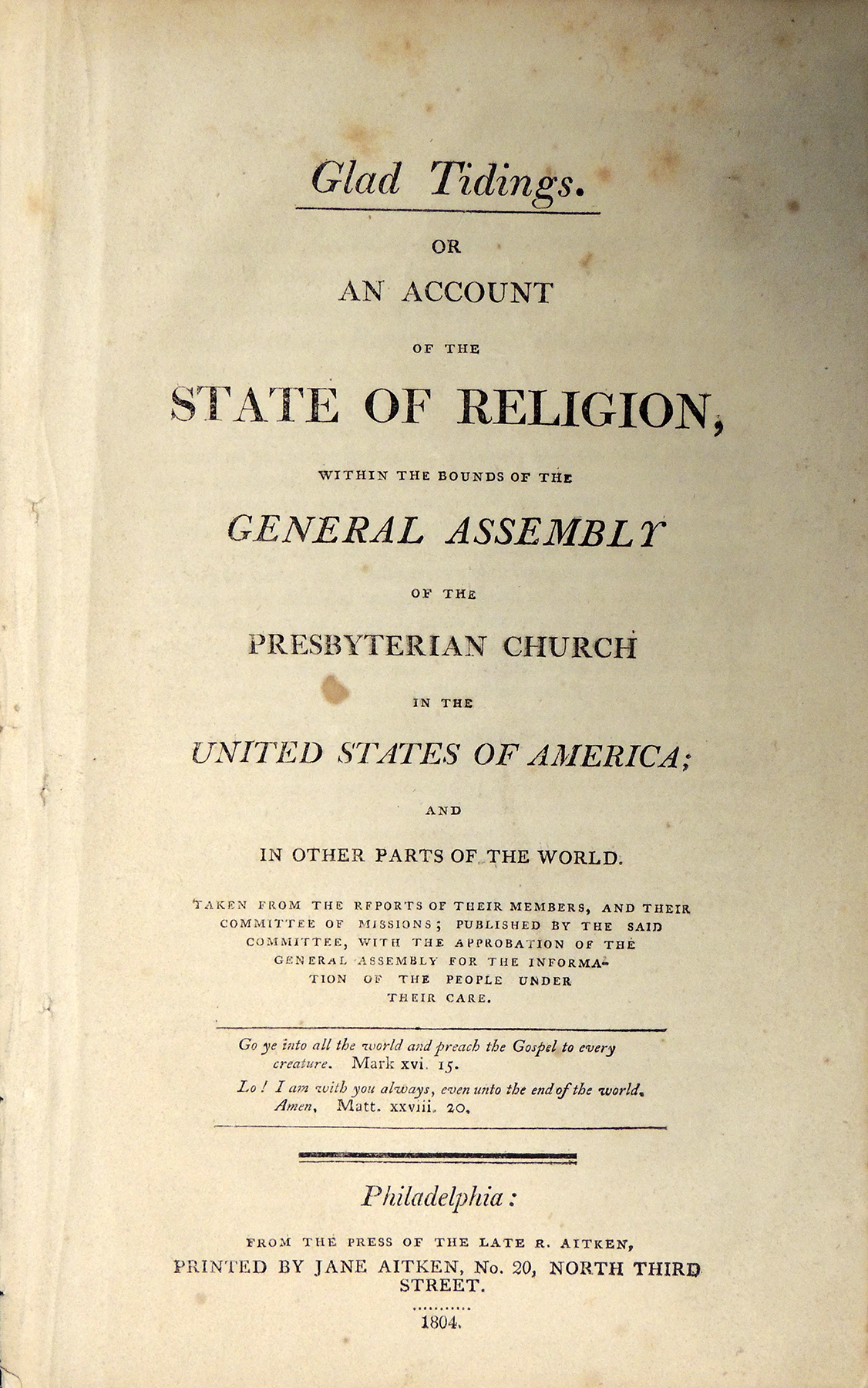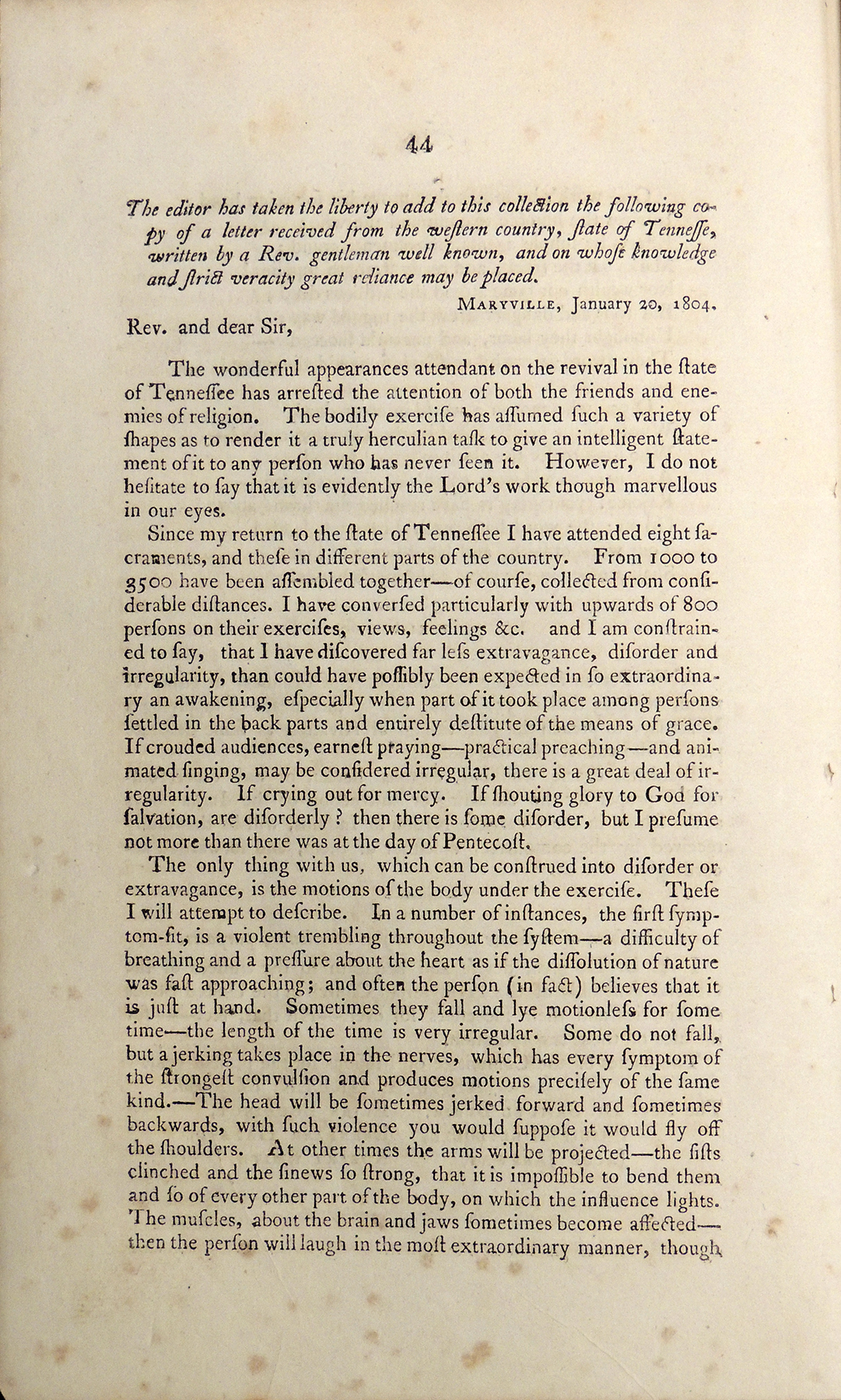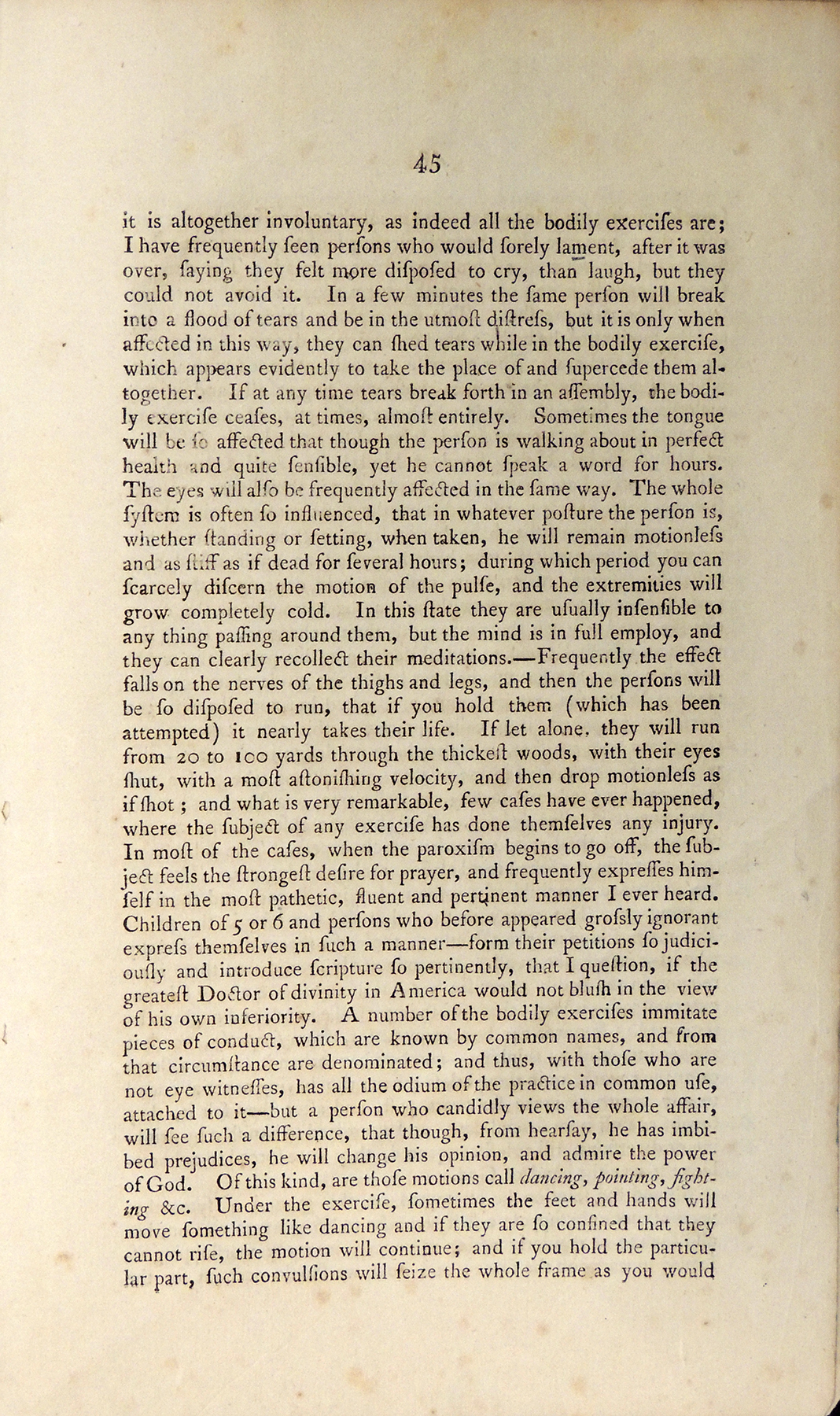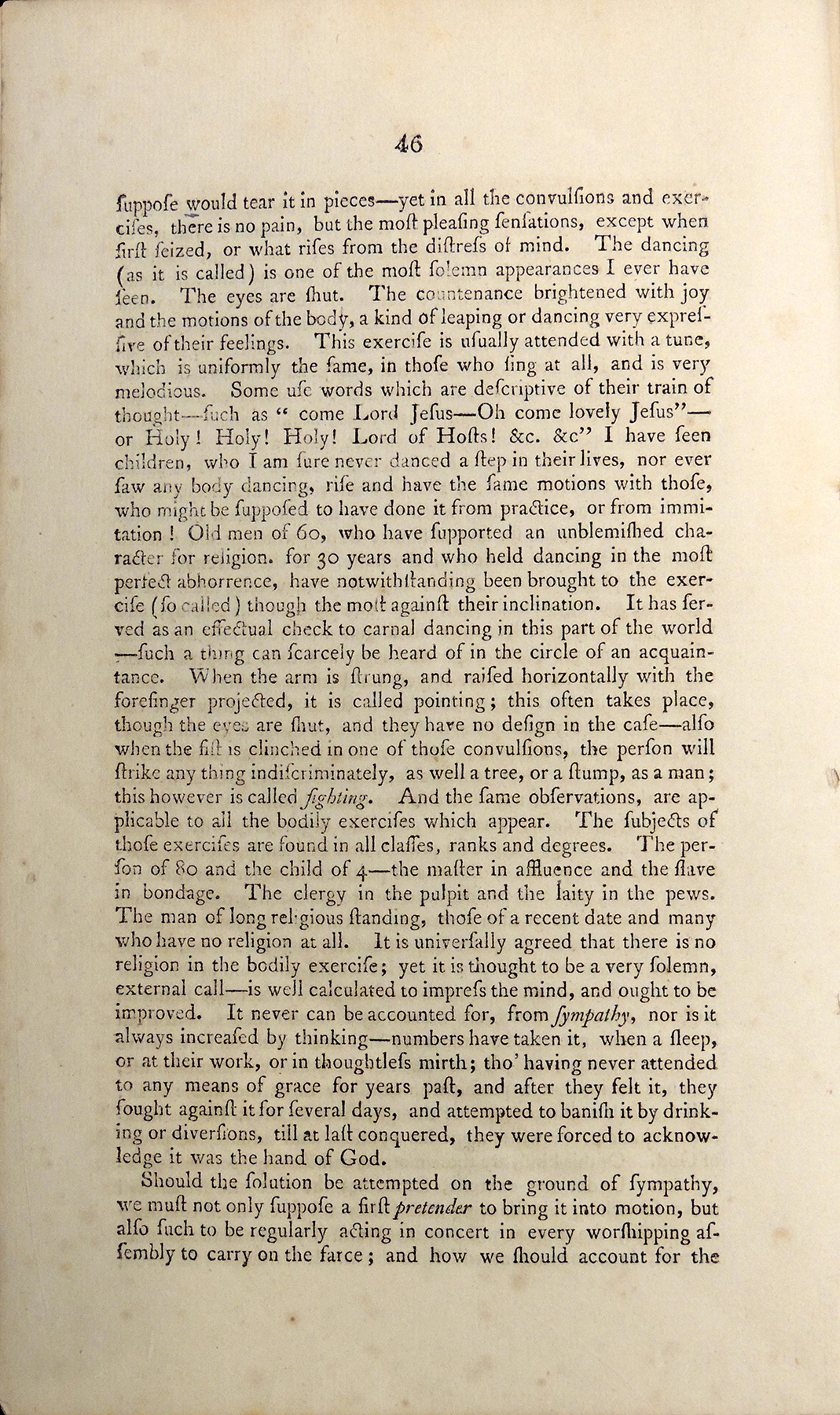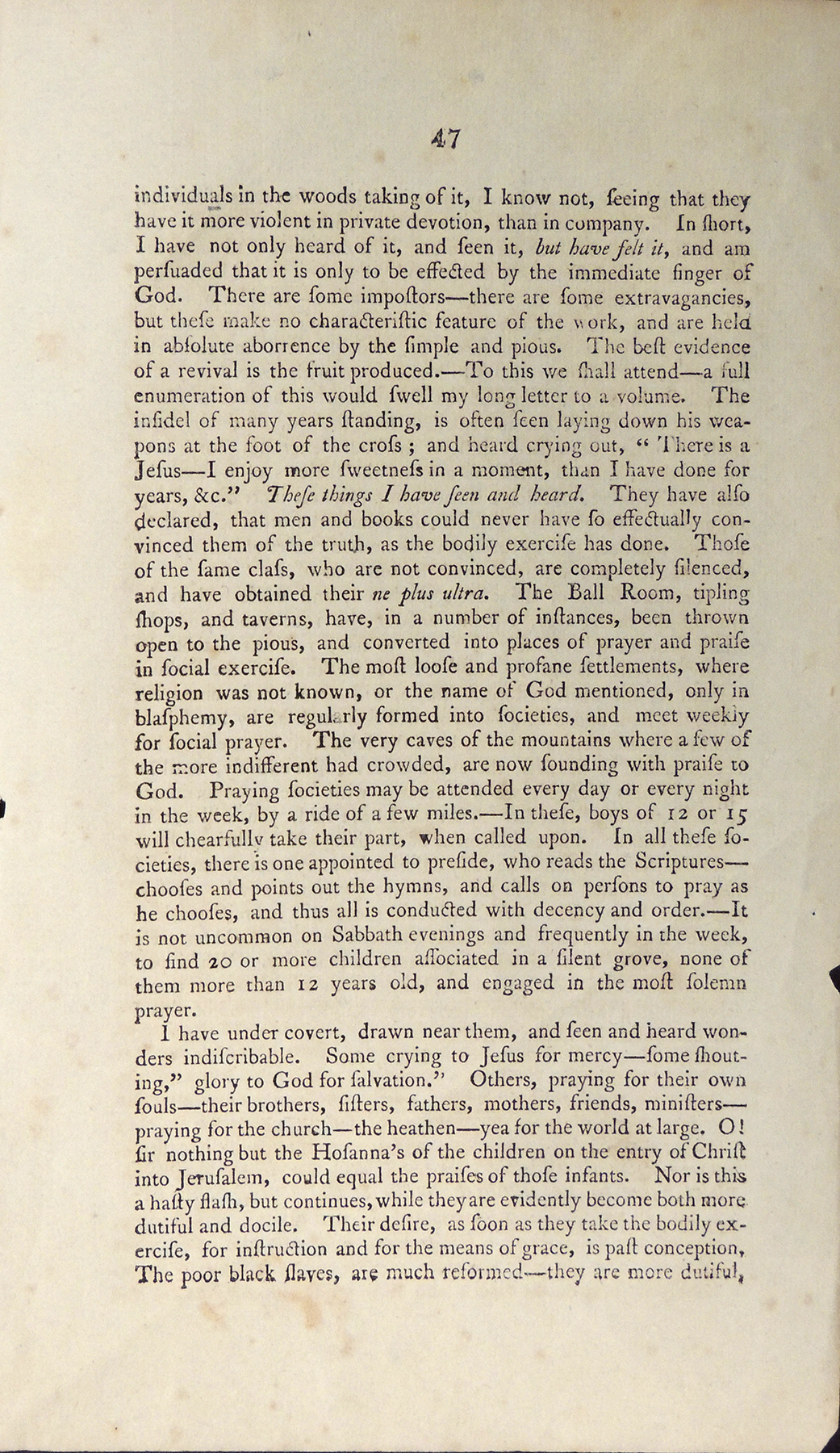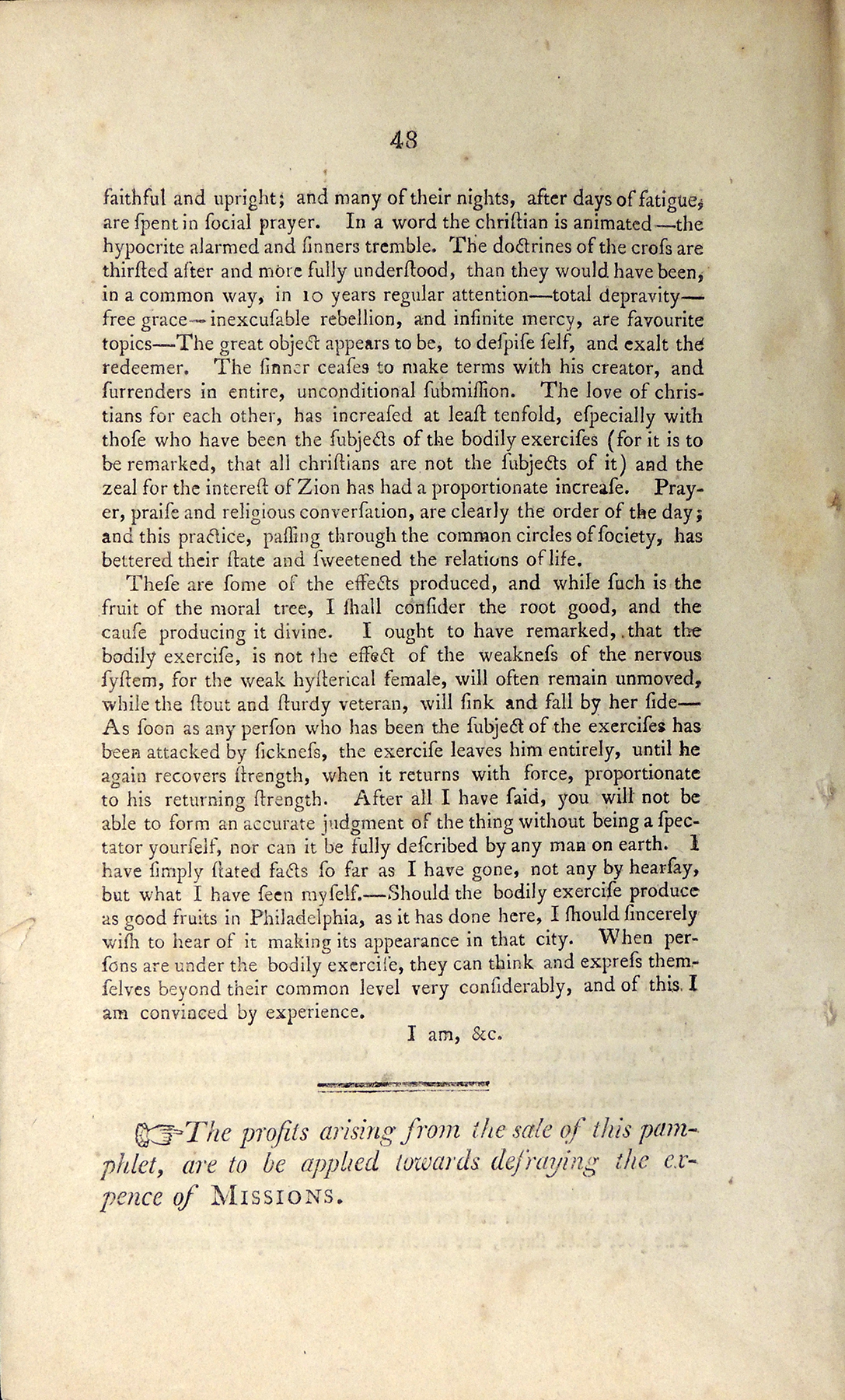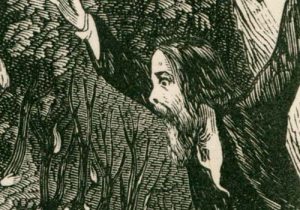In this detailed letter to Ashbel Green of Phiadelphia, Presbyterian minister Gideon Blackburn reprises his first account of the religious convulsions that erupted among his congregants in Maryville, Tennessee, during the summer of 1803 (click here). Blackburn’s sense of expectation is palpable, and his description of the “variety and shapes” of the bodily exercises remains unsurpassed among his contemporaries. Green published the letter in a short pamphlet entitled Glad Tidings: Or An Account of the State of Religion, within the Bounds of the General Assembly of the Presbyterian Church in the United States (1804).
The editor has taken the liberty to add to this collection the following copy of a letter received from the western country, state of Tennessee, written by a Rev. gentleman well known, and on whose knowledge and strict veracity great reliance may be placed.
MARYVILLE, January 20, 1804. Rev. and dear Sir,
The wonderful appearances attendant on the revival in the state of Tennessee has arrested the attention of both the friends and enemies of religion. The bodily exercise has assumed such a variety of shapes as to render it a truly herculian task to give an intelligent statement of it to any person who has never seen it. However, I do not hesitate to say, that it is evidently the Lord’s work, though marvellous in our eyes.
Since my return to the state of Tennessee I have attended eight sacraments, and these in different parts of the country. From 1000 to 3500 have been assembled together—of course, collected from considerable distances. I have conversed particularly with upwards of 800 persons on their exercises, views, feelings, &c. and I am constrained to say, that I have discovered far less extravagance, disorder, and irregularity, than could have possibly been expected in so extraordinary an awakening, especially when part of it took place among persons settled in the back parts and entirely destitute of the means of grace. If crouded audiences, earnest praying—practical preaching—and animated singing, may be considered irregular, there is a great deal of irregularity. If crying out for mercy. If shouting glory to God for salvation, are disorderly? then there is some disorder, but, I presume not more than there was at the day of Pentecost.
The only thing with us, which can be construed into disorder or extravagance, is the motions of the body under the exercise. These I will attempt to describe. In a number of instances, the first symptom-fit, is a violent trembling throughout the system—a difficulty of breathing and a pressure about the heart as if the dissolution of nature was fast approaching; and often the person (in fact) believes that it is just at hand. Sometimes they fall and lye motionless for some time—the length of the time is very irregular. Some do not fall, but a jerking takes place in the nerves, which has every symptom of the strongest convulsion and produced motions precisely of the same kind.—The head will be sometimes jerked forward and sometimes backwards, with such violence you would suppose it would fly off the shoulders. At other times the arms will be projected—the fists clenched and the sinews so strong, that it is impossible to bend them and so of every other part of the body, on which the influence lights. The muscles, about the brain and jaw sometimes become affected—then the person will laugh in the most extraordinary manner, though it is altogether involuntary, as indeed all the bodily exercises are; I have frequently seen persons who would sorely lament, after it was over, saying they felt more disposed to cry, than laugh, but they could not avoid it. In a few minutes the same persons will break into a flood of tears and be in the utmost distress, but it is only when affected in this way, they can shed tears while in the bodily exercise, which appears evidently to take the place of and supercede them altogether. If at any time tears break forth in an assembly, the bodily exercise ceases, at times, almost entirely. Sometimes the tongue will be so affected that though the person is walking about in perfect health and quite sensible, yet he cannot speak a word for hours. The eyes will also be frequently affected in the same way. The whole system is often so influenced, that in whatever posture the person is, whether standing or setting, when taken, he will remain motionless and as stiff as if dead for several hours; during which period you can scarcely discern the motion of the pulse, and the extremities will grow completely cold. In this state they are usually insensible to any thing passing around them, but the mind is in full employ, and they can clearly recollect their meditations.—Frequently the effect falls on the nerves of the thighs and legs, and then the persons will be so disposed to run, that if you hold them (which has been attempted) it nearly takes their life. If let alone, they will run from 20 to 100 yards through the thickest woods, with their eyes shut, with a most astonishing velocity, and then drop motionless as if shot; and what is very remarkable, few cases have ever happened, where the subject of any exercise has done themselves any injury. In most of the cases, when the paroxism begins to go off, the subject feels the strongest desire for prayer, and frequently expresses himself in the most pathetic, fluent and pertinent manner I ever heard. Children of 5 or 6 and persons who before appeared grossly ignorant express themselves in such a manner—form their petitions so judiciously and introduce scripture so pertinently, that I question, if the greatest Doctor of divinity in America would not blush in the view of his own inferiority. A number of the bodily exercises imitate pieces of conduct, which are known by common names, and from that circumstance are denominated; and thus, with those who are not eye witnesses, has all the odium of the practice in common use, attached to it—but a person who candidly views the whole affair, will see such a difference, that though, from hearsay, he has imbibed prejudices, he will change his opinion, and admire the power of God. Of this kind, are those motions called dancing, pointing, fighting &c. Under the exercise, sometimes the feet and hands will move something like dancing and if they are so confined that they cannot rise, the motion will continue; and if you hold the particular part, such convulsions will seize the whole frame as you would supposed would tear it in pieces—yet in all the convulsions and exercises, there is no pain, but the most pleasing sensations, except when first seized, or what rises from the distress of mind. The dancing (as it is called0 is one of the most solemn appearances I have ever seen. The eyes are shut. The countenance brightened with joy and the motions of the body, a kind of leaping or dancing very expressive of their feelings. This exercise is usually attended with a tune, which is uniformly the same, in those who sing at all, and is very melodious. Some use words which are descriptive of their train of thought—such as “come Lord Jesus—Oh come lovely Jesus”—or “Holy! Holy! Holy! Lord of Hosts! &c. &c.” I have seen Children, who I am sure never danced a step in their lives, nor ever saw any body dancing, rise and have the same motions with those, who might be supposed to have done it from practice, or from imitation! Old men of 60, who have supported an unblemished character for religion, for 30 years and who held dancing in the most perfect abhorrence, have notwithstanding been brought to the exercise (so called0 though the most against their inclination. It has served as an effectual check to carnal dancing in this part of the world—such a thing can scarcely be heard of in the circle of an acquaintance. When the arm is strung, and raised horizontally with the forefinger projected, it is called pointing; this often takes place, though the eyes are shut, and they have no design in the case—also when the first is clinched in one of those convulsions, the person will strike any thing indiscriminately, as well a tree, or a stump as a man; this however is called fighting. And at the same observations, are applicable to all the bodily exercises which appear. The subjects of those exercises are sound in all classes, ranks, and degrees—the person of 80 and the child of 4—the master in affluence and the slave in bondage. The clergy in the pulpit and the laity in the pews. The man of long religious standing, those of a recent date and many who have no religion at all. It is universally agreed that there is no religion in the bodily exercise; yet it is thought to be a very solemn, external call—is well calculated to impress the mind, and ought to be improved. It never can be accounted for, from sympathy, nor is it always increased by thinking—numbers have taken it, when a sleep, or at their work, or in thoughtless mirth; tho’ having never attended to any means of grace for years past, and after they felt it, they fought against it for several days, and attempted to banish it by drinking or diversions, till at last conquered, they were forced to acknowledge it was the hand of God.
Should the solution be attempted on the ground of sympathy, we must not only suppose a first pretender to bring it into motion, but such to be regularly acting in concert in every worshipping assembly to carry on the farce; and how we should account for the individuals in the woods taking of it, I know not, seeing that they have it more violent in private devotions, than in company. In short, I have not only heard of it, and seen it, but have felt it, and am persuaded that it is only to be effected by the immediate finger of God. There are some impostors—there are some extravagances, but these make no characteristic feature of the work, and are held in absolute abhorrence by the simple and pious. The best evidence of a revival is the fruit produced.—To this we shall attend—a full enumeration of this would swell my long letter to a volume. The infidel of many years standing, is often seen laying down his weapons at the foot of the cross; and heard crying out, “There is a Jesus—I enjoy more sweetness in a moment, than I have done for years, &c.” These things I have seen and heard. They have also declared, that men and books could never have so effectually convinced them of the truth, as the bodily exercise has done. Those of the same class, who are not convinced, are completely silenced, and have obtained their ne plus ultra. The Ball Room, tipling shops, and taverns, have, in a number of instances, been thrown open to the pious, and converted into places of prayer and praise in social exercise. The most loose and profane settlements, where religion was not known, or the name of God mentioned, only in blasphemy, are regularly formed into societies, and meet weekly for social prayer. The very caves of the mountains, where a few of the more indifferent had crowded, are now sounding with praise to God. Praying societies may be attended every day or every night in the week, by a ride of a few miles. In these, boys of 12 or 15 will cheerfully take their part, when called upon. In all these societies, there is one appointed to preside, who reads the Scriptures—chooses and points out the hymns, and calls on persons to pray, as he chooses, and thus all is conducted with decency and order. It is not uncommon on Sabbath evenings and frequently in the week, to find 20 or more children associated in a silent grove, none of them more than twelve years old, and engaged in the most solemn prayer.
I have under convert, drawn near them, and seen and heard wonders indescribable. Some crying to Jesus for mercy—some shouting, “glory to God for salvation.” Others, praying for their own souls—their brothers, sisters, fathers, mothers, friends, ministers—praying for the church—the heathen—yea, for the world at large. O! sir nothing but the Hosanna’s of the children on the entry of Christ into Jerusalem, could equal the praises of these infants. Nor is this a hasty flash, but continues, while they are evidently become both more dutiful and docile. Their desire, as soon as they take the bodily exercise, for instruction and for the means of grace, is past conception. The poor black slaves are much reformed—they are more dutiful, faithful, and upright; and many of their nights, after days of fatigue, are spent in social prayer. In a word the Christian is animated—the hypocrite alarmed and sinners tremble. The doctrines of the cross are thirsted after and more fully understood, than they would have been, in a common way, in 10 years regular attention—total depravity—free grace, inexcusable rebellion, and infinite mercy, are favourite topics—The great object appears to be, to despise self, and exalt the redeemer. The sinner ceases to make terms with his creator, and surrenders in entire, unconditional submission. The love of christians for each other, has increased at least tenfold, especially with those who have been the subjects of the bodily exercises (for it is to be remarked, that all christians are not the subjects of it) and the zeal for the interest of Zion has had a proportionate increase. Prayer, praise and religious conversation, are clearly the order of the day; and this practice, passing through the common circles of society, has bettered their state and sweetened the relations of life.
These are some of the effects produced, and while such is the fruit of the moral tree, I shall consider the root good, and the cause producing it divine. I ought to have remarked, that the bodily exercise, is not the effect of the weakness of the nervous system, for the weak, hysterical female will often remain unmoved, while the stout and sturdy veteran will sink and fall by her side—As soon as any person who has been the subject of the exercises has been attacked by sickness, the exercise leaves him entirely, until he again recovers strength, when it returns with force, proportionate to his returning strength. After all I have said, you will not be able to form an accurate judgment of the thing without being a spectator yourself, nor can it be fully described by any man on earth. I have simply stated facts so far as I have gone, not any by hearsay, but what I have seen myself.—Should the bodily exercise produce as good fruits in Philadelphia, as it has done here, I should sincerely wish to hear of it making its appearance in that city. When persons are under the bodily exercise, they can think and express themselves beyond their common level very considerably, and of this I am convinced by experience.
I am, &c.
Source
[Gideon Blackburn] to [Ashbel Green], January 20, 1804, in Glad Tidings: Or An Account of the State of Religion, within the Bounds of the General Assembly of the Presbyterian Church in the United States of America; and in Other Parts of the World (Philadelphia: Jane Aitken, 1804), 44–48. Images courtesy of the American Antiquarian Society, Worcester, Massachusetts
